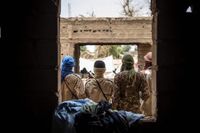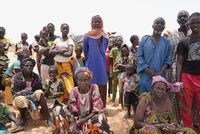A court in Burkina Faso has launched an investigation into social media posts inciting violence against the Fulani people, an ethnic group frequently targeted in the Sahel region. This inquiry comes in the wake of outrage following the release of videos depicting the brutal killings of Fulani civilians just last week in Solenzo, located in the country’s western region.
The killings, which have drawn widespread condemnation, were attributed to the army and allied militias. However, those entities have vehemently denied the allegations. In response to the rising tensions, Ouagadougou High Court public prosecutor Blaise Bazie announced on Thursday, March 20, 2025, that authorities were actively investigating individuals who have published or shared inflammatory posts calling for the “extermination” of members of an ethnic group. While the prosecutor did not explicitly name the community, it is clear that most of the hate-filled messages referenced the Fulani.
Some users have justified their calls for violence against the Fulani by claiming that members of this ethnic group are responsible for the insurgency plaguing Burkina Faso. Law enforcement is now poised to take action. Bazie stated, “Investigations are underway, and perpetrators will be arrested in the coming days.” He further warned that such incendiary rhetoric poses “serious threats to peace and social cohesion” within the nation and could potentially lead to prison sentences for those involved.
Burkina Faso has found itself engulfed in violence since 2015, a situation that has led to the deaths of more than 26,000 people—over half of them occurring since the military coup in 2022, according to the Armed Conflict Location & Event Data Project (ACLED). The continuous strife has underscored the deepening divisions within the country, particularly as different ethnic groups engage in a struggle for survival amid widespread lawlessness.
The Fulani, primarily a semi-nomadic ethnic group, often find themselves at the center of these tensions. Across the Sahel, they are frequently stigmatized and accused of being complicit with jihadist groups, thus facing general suspicion and hostility from others. The broader narrative circulating online amplifies these accusations, casting the Fulani as a monolithic entity responsible for the chaos affecting the region.
In a chilling statement, Bazie emphasized, “These messages, which are speeches inciting scenes of violence, constitute serious threats to peace and social cohesion.” This sentiment reflects the precarious situation in which Burkina Faso currently finds itself, caught in a cycle of violence that continually challenges the fabric of society.
As the investigation progresses, many are left to ponder the long-term implications of such rhetoric on national unity. The outcome could shape not only the future of the Fulani people within Burkina Faso but also the country’s overall stability in a region marred by conflict.
The rise of social media as a platform for hate speech poses unique challenges for officials. In an age where misinformation spreads quickly and has the potential to incite real-world violence, the responsibility of social media companies and the government to regulate content becomes glaringly evident. Further complicating the situation are the fears that such actions could lead to increased tensions between ethnic groups already living on the knife’s edge of conflict.
Ultimately, this unfolding legal process may serve as a vital test for Burkina Faso's democracy. How the state chooses to respond to these incendiary messages will reveal much about its commitment to protecting individual rights while maintaining public order. With many looking to the investigation's outcomes as a sign of the nation’s direction, the implications of the court's decisions could resonate throughout the Sahel.
Whether justice prevails or inflames existing prejudices remains to be seen. The world is watching Burkina Faso closely, aware that its response to the current crisis could either foster greater solidarity or deepen societal divides. As the investigation continues, both government officials and civil society must tread carefully, striving to promote dialogue over division in a nation that needs healing more than ever.


